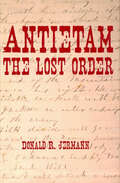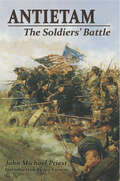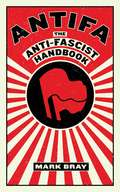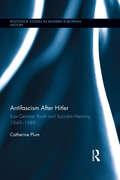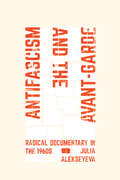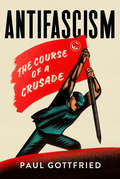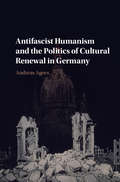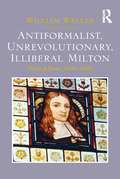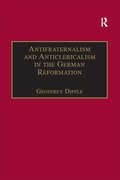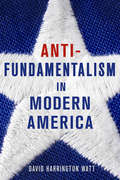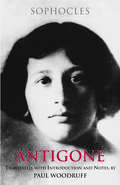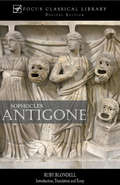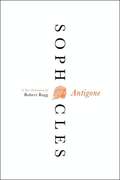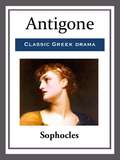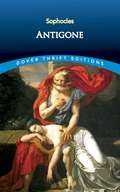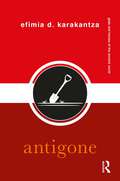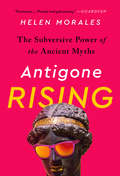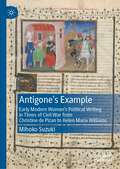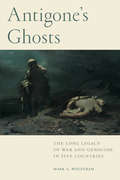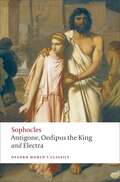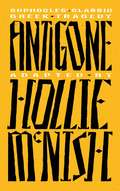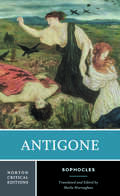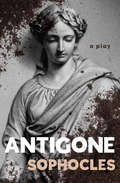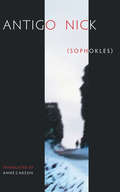- Table View
- List View
Antietam: The Lost Order
by Captain Donald R. Jermann&“This accessible narrative describes the impact of the discovery of this lost order on the pivotal Battle of Antietam.&” —Book News Inc. &“This book is not a dry history book but instead quite lively as it presents the story of the lost order and the events surrounding it, and it is highly recommended to Civil War enthusiasts.&”—Curledup.com Under an unfortunate set of circumstances on September 13, 1862, the Confederates lost and the Union recovered a copy of Confederate battle plan Special Order 191. &“If I can&’t beat Bobby Lee with this piece of paper, I will be willing to go home,&” said Union army leader George B. McClellan upon reading the document. Antietam: The Lost Order covers the hours between the time McClellan read Lee&’s plan and Lee&’s army reunited. Thirty-seven maps display the tactics employed as the clock ticked from September 9 to September 19, including Harper&’s Ferry defenses, McLaw&’s Brigade deployments, relief routes for Harper&’s Ferry, the Battle of Maryland Heights, and other significant plans and battles. Antietam: The Lost Order explains why Harper&’s Ferry was key to the Union victory in September 1862, the importance of the location and timing of the Battle of Antietam, and how its outcome influenced the future of our country. The book concludes by analyzing what went wrong on the Union side, the lasting impact of finding the lost order, and finally, the fates of the major players. With as much emphasis given to human foibles as to troop movements, this book will appeal to a wide audience beyond Civil War devotees.
Antietam: The Soldiers' Battle
by Jay Luvaas John Michael Priest“The best battlefield first-person compilation I have read . . . Here it all is—the tactics, the movement, the truth about warfare.” —The Civil War TimesIn Antietam: The Soldiers’ Battle, historian John Michael Priest tells this brutal tale of slaughter from an entirely new point of view: that of the common enlisted man. Concentrating on the days of actual battle—September 16, 17, and 18, 1862—Priest vividly brings to life the fear, the horror, and the profound courage that soldiers displayed, from the first Federal cavalry probe of the Confederate lines to the last skirmish on the streets of Sharpsburg. Antietam is not a book about generals and their grand strategies, but rather concerns men such as the Pennsylvanian corporal who lied to receive the Medal of Honor; the Virginian who lay unattended on the battlefield through most of the second day of fighting, his arm shattered from a Union artillery shell; the Confederate surgeon who wrote to the sweetheart he left behind enemy lines in Harrisburg, Pennsylvania that he had seen so much death and suffering that his “head had whitened and my very soul turned to stone.”Besides being a gripping tale charged with the immediacy of firsthand accounts of the fighting, Antietam also dispels many misconceptions long held by historians and Civil War buffs alike. Seventy-two detailed maps—which describe the battle in the hourly and quarter-hourly formats established by the Cope Maps of 1904—together with rarely-seen photographs and his own intimate knowledge of the Antietam terrain, allow Priest to offer a substantially new interpretation of what actually happened.
Antifa: The Antifascist Handbook
by Mark Bray“Focused and persuasive... Bray’s book is many things: the first English-language transnational history of antifa, a how-to for would-be activists, and a record of advice from anti-Fascist organizers past and present.”--THE NEW YORKER"Insurgent activist movements need spokesmen, intellectuals and apologists, and for the moment Mark Bray is filling in as all three... The book’s most enlightening contribution is on the history of anti-fascist efforts over the past century, but its most relevant for today is its justification for stifling speech and clobbering white supremacists."--THE WASHINGTON POST, Carlos Lozada"An excellent primer and essential reading."--COUNTER PUNCHIn the wake of tragic events in Charlottesville, VA, and Donald Trump's initial refusal to denounce the white nationalists behind it all, the "antifa" opposition movement is suddenly appearing everywhere. But what is it, precisely? And where did it come from? As long as there has been fascism, there has been anti-fascism — also known as “antifa.” Born out of resistance to Mussolini and Hitler in Europe during the 1920s and ’30s, the antifa movement has suddenly burst into the headlines amidst opposition to the Trump administration and the alt-right. They could be seen in news reports, often clad all in black with balaclavas covering their faces, demonstrating at the presidential inauguration, and on California college campuses protesting far-right speakers, and most recently, on the streets of Charlottesville, VA, protecting, among others, a group of ministers including Cornel West from neo-Nazi violence. (West would later tell reporters, "The anti-fascists saved our lives.")Simply, antifa aims to deny fascists the opportunity to promote their oppressive politics, and to protect tolerant communities from acts of violence promulgated by fascists. Critics say shutting down political adversaries is anti-democratic; antifa adherents argue that the horrors of fascism must never be allowed the slightest chance to triumph again.In a smart and gripping investigation, historian and former Occupy Wall Street organizer Mark Bray provides a detailed survey of the full history of anti-fascism from its origins to the present day — the first transnational history of postwar anti-fascism in English. Based on interviews with anti-fascists from around the world, Antifa details the tactics of the movement and the philosophy behind it, offering insight into the growing but little-understood resistance fighting back against fascism in all its guises.
Antifascism After Hitler: East German Youth and Socialist Memory, 1949-1989 (Routledge Studies in Modern European History #27)
by Catherine PlumAntifascism After Hitler investigates the antifascist stories, memory sites and youth reception that were critical to the success of political education in East German schools and extracurricular activities. As the German Democratic Republic (GDR) promoted national identity and socialist consciousness, two of the most potent historical narratives to permeate youth education became tales of communist resistors who fought against fascism and the heroic deeds of the Red Army in World War II. These stories and iconic images illustrate the message that was presented to school-age children and adolescents in stages as they advanced through school and participated in the official communist youth organizations and other activities. This text delivers the first comprehensive study of youth antifascism in the GDR, extending scholarship beyond the level of the state to consider the everyday contributions of local institutions and youth mentors responsible for conveying stories and commemorative practices to generations born during WWII and after the defeat of fascism. While the government sought to use educators and former resistance fighters as ideological shock troops, it could not completely dictate how these stories would be told, with memory intermediaries altering at times the narrative and message. Using a variety of primary sources including oral history interviews, the author also assesses how students viewed antifascism, with reactions ranging from strong identification to indifference and dissent. Antifascist education and commemoration were never simply state-prescribed and were not as "participation-less" as some scholars and contemporary observers claim, even as educators fought a losing battle to maintain enthusiasm.
Antifascism and the Avant-Garde: Radical Documentary in the 1960s
by Julia AlekseyevaLeftist filmmakers of the 1960s revolutionized the art of documentary. Often inspired by the radical art of the Soviet 1920s, filmmakers in countries like France and Japan dared to make film form a powerful weapon in the fight against fascism, weaving fiction into nonfiction and surrealism with neorealism to rupture everyday ways of being, seeing, and thinking. Through careful readings of Matsumoto Toshio, Jean-Luc Godard, Chris Marker, Agnès Varda, Hani Susumu, and others, Julia Alekseyeva shows that avant-garde documentary films of the 1960s did not strive to inoculate the viewer with the ideology of Truth but instead aimed to unveil and estrange, so that viewers might approach capitalist, imperialist, and fascist media with critical awareness. Antifascism and the Avant-Garde thus provides a transnational ecology of antifascist art that resonates profoundly with our current age.
Antifascism: The Course of a Crusade
by Paul GottfriedA conservative take on the antifascist movementAntifascism argues that current self-described antifascists are not struggling against a reappearance of interwar fascism, and that the Left that claims to be opposing fascism has little in common with any earlier Left, except for some overlap with critical theorists of the Frankfurt School. Paul Gottfried looks at antifascism from its roots in early twentieth-century Europe to its American manifestation in the present. The pivotal development for defining the present political spectrum, he suggests, has been the replacement of a recognizably Marxist Left by an intersectional one. Political and ideological struggles have been configured around this new Left, which has become a dominant force throughout the Western world. Gottfried discusses the major changes undergone by antifascist ideology since the 1960s, fascist and antifascist models of the state and assumptions about human nature, nationalism versus globalism, the antifascism of the American conservative establishment, and Antifa in the United States. Also included is an excursus on the theory of knowledge presented by Thomas Hobbes in Leviathan. In Antifascism Gottfried concludes that promoting a fear of fascism today serves the interests of the powerful—in particular, those in positions of political, journalistic, and educational power who want to bully and isolate political opponents. He points out the generous support given to the intersectional Left by multinational capitalists and examines the movement of the white working class in Europe—including former members of Communist parties—toward the populist Right, suggesting this shows a political dynamic that is different from the older dialectic between Marxists and anti-Marxists.
Antifascist Humanism and the Politics of Cultural Renewal in Germany
by Andreas AgocsAntifascism is usually described as either a political ideology of activists and intellectuals confronting the dictatorships of Hitler and Mussolini, or as a cynical tool that justified the Stalinist expansion of communism in Europe. Andreas Agocs widens our understanding of antifascism by placing it in the context of twentieth-century movements of 'cultural renewal'. He explores the concept of 'antifascist humanism', the attempt by communist and liberal intellectuals and artists to heal the divisions of Nazism by reviving the 'other Germany' of classical Weimar. This project took intellectual shape in German exile communities in Europe and Latin America during World War II and found its institutional embodiment in the Cultural League for Democratic Renewal in Soviet-occupied Berlin in 1945. During the emerging Cold War, antifascist humanism's uneasy blend of twentieth-century mass politics and cultural nationalism became the focal point of new divisions in occupied Germany and the early German Democratic Republic. This study traces German traditions of cultural renewal from their beginnings in antifascist activism to their failure in the emerging Cold War.
Antiformalist, Unrevolutionary, Illiberal Milton: Political Prose, 1644-1660
by William WalkerOn the basis of a close reading of Milton's major published political prose works from 1644 through to the Restoration, William Walker presents the anti-formalist, unrevolutionary, illiberal Milton. Walker shows that Milton placed his faith not so much in particular forms of government as in statesmen he deemed to be virtuous. He reveals Milton's profound aversion to socio-political revolution and his deep commitments to what he took to be orthodox religion. He emphasises that Milton consistently presents himself as a champion not of heterodox religion, but of 'reformation'. He observes how Milton's belief that all men are not equal grounds his support for regimes that had little popular support and that did not provide the same civil liberties to all. And he observes how Milton's powerful commitment to a single religion explains his endorsement of various English regimes that persecuted on grounds of religion. This reading of Milton's political prose thus challenges the current consensus that Milton is an early modern exponent of republicanism, revolution, radicalism, and liberalism. It also provides a fresh account of how the great poet and prose polemicist is related to modern republics that think they have separated church and state.
Antifraternalism and Anticlericalism in the German Reformation: Johann Eberlin von Günzburg and the Campaign Against the Friars (St Andrews Studies in Reformation History)
by Geoffrey DippleMany of the leading figures of the Reformation and many of their most able opponents came from among the ranks of the Franciscan Order. This Order became the focus of attack in a pamphlet war waged against it in 1523 by converts to the Reformation. These criticisms were based on arguments by Luther in his Judgement on Monastic Vows, and the pamphlets provided an important channel for these views. Luther’s arguments were also reinforced by criticisms of the mendicant orders drawn from medieval polemical and satirical literature. The campaign of 1523 brought together both Reformation and pre-Reformation anticlerical themes. In this book Geoffrey Dipple looks at the perception of the Franciscan order in the 15th and 16th centuries, placing the attacks firmly in the context of late medieval inter-clerical rivalries. He looks particularly at the anticlerical polemics of one of the primary participants - Johann Eberlin von Günzburg - the most vocal of the Franciscan’s critics.
Antifundamentalism in Modern America
by David Harrington WattDavid Harrington Watt's Antifundamentalism in Modern America gives us a pathbreaking account of the role that the fear of fundamentalism has played—and continues to play—in American culture. Fundamentalism has never been a neutral category of analysis, and Watt scrutinizes the various political purposes that the concept has been made to serve. In 1920, the conservative Baptist writer Curtis Lee Laws coined the word "fundamentalists." Watt examines the antifundamentalist polemics of Harry Emerson Fosdick, Talcott Parsons, Stanley Kramer, and Richard Hofstadter, which convinced many Americans that religious fundamentalists were almost by definition backward, intolerant, and anti-intellectual and that fundamentalism was a dangerous form of religion that had no legitimate place in the modern world. For almost fifty years, the concept of fundamentalism was linked almost exclusively to Protestant Christians. The overthrow of the Shah of Iran and the establishment of an Islamic republic led to a more elastic understanding of the nature of fundamentalism. In the late 1970s and early 1980s, Americans became accustomed to using fundamentalism as a way of talking about Muslims, Jews, Hindus, Sikhs, and Buddhists, as well as Christians. Many Americans came to see Protestant fundamentalism as an expression of a larger phenomenon that was wreaking havoc all over the world. Antifundamentalism in Modern America is the first book to provide an overview of the way that the fear of fundamentalism has shaped U.S. culture, and it will lead readers to rethink their understanding of what fundamentalism is and what it does.
Antigone
by Paul Woodruff Sophocles<P>Woodruff's work with Peter Meineck makes this text one that is accessible to today's students and could be staged for modern audiences. Line notes printed at the bottom of the page bring a reader further quick assistance. . . . <P>The choral odes as rendered here deserve special notice. After giving a succinct analysis of each in his introduction, Woodruff translates the lyrics into English that is both poetic and comprehensible. . . . <P>Woodruff's rendering of the dialogue moves along easily; these are lines that any contemporary Antigone, Creon or Haemon might speak. Antigone's words on the gods' unwritten laws keep close to the Greek and yet would be authentic for a modern speaker. . . . <P> Woodruff's introduction is a strong, clear, and clever blend of basic traditional information (to those who know Greek tragedy) and fresh insights. . . .
Antigone
by Sophocles Ruby BlondellThis is an English translation of Sophocles' tragedy of Antigone and her fate when she decides to bury her dead brother Polyneices. Focus Classical Library provides close translations with notes and essays to provide access to understanding Greek culture.
Antigone
by SophoclesAmong the most celebrated plays of ancient Athens, Antigone is one of the seven surviving dramas by the great Greek playwright, Sophocles, now available from Harper Perennial in a vivid and dynamic new translation by award-winning poet Robert Bagg. Powerfully portraying the clash between civic and familial duty—between morality and obedience—the play brings the Oedipus Cycle to a conclusion with the story of the tragic hero's eldest daughter Antigone, who courts her own death by defying the edict of Thebes's new ruler, her uncle Kreon, which forbids giving her dishonored brother a proper burial. This is Sophocles, vibrant and alive, for a new generation.
Antigone
by SophoclesSophocles addresses themes of civil disobedience, fidelity, and love for family; and questions which law is greater: the gods' or man's--in this play that challenged many established mores of Ancient Greece.
Antigone
by SophoclesIn his long life, Sophocles (born ca. 496 B.C., died after 413) wrote more than one hundred plays. Of these, seven complete tragedies remain, among them the famed Oedipus Rex and Oedipus at Colonus. In Antigone, he reveals the fate that befalls the children of Oedipus. With its passionate speeches and sensitive probing of moral and philosophical issues, this powerful drama enthralled its first Athenian audiences and won great honors for Sophocles.The setting of the play is Thebes. Polynices, son of Oedipus, has led a rebellious army against his brother, Eteocles, ruler of Thebes. Both have died in single combat. When Creon, their uncle, assumes rule, he commands that the body of the rebel Polynices be left unburied and unmourned, and warns that anyone who tampers with his decree will be put to death.Antigone, sister of Polynices, defies Creon's order and buries her brother, claiming that she honors first the laws of the gods. Enraged, Creon condemns her to be sealed in a cave and left to die. How the gods take their revenge on Creon provides the gripping denouement to this compelling tragedy, which remains today one of the most frequently performed of classical Greek dramas.
Antigone (Gods and Heroes of the Ancient World)
by Efimia D. KarakantzaThis book explores the figure of Antigone and her many reconceptualizations from antiquity to the present. One of the most popular heroines of classical literature, Antigone defied political authority to carry out the forbidden burial of her brother. Readers will become familiar with the key themes of Antigone’s story, such as the law and politics, gender, and death, tracing their survival and transformations over time. Notably, the book explores the thorough de-politicization of the heroine in philosophy and psychoanalysis, followed by a reversal and re-politicization through feminist and socio-political theories. It provides a useful tool to approach postmodern receptions of Antigone in the arts and society in the modern era, particularly in the contexts of occupied and civil war-era Greece, in Palestine, and in Syrian refugee camps in Lebanon. It also addresses issues of Antigone-like struggles of individuals or collectivities to overcome obstacles of systemic and racialized violence and gender-based oppression in the 21st century, while challenging heteronormative practices and policies to allow new subjectivities to emerge. Though Antigone’s story is complex, Karakantza provides an accessible, fascinating overview of this enduring figure’s legacy and impact over the course of history. Antigone provides a comprehensive study of this classical heroine, suitable for students and scholars of classical literature, reception studies, and gender studies. It also appeals to theatre practitioners interested in adapting and staging Sophocles’ Antigone, or any Antigone of the ancient sources.
Antigone Rising: The Subversive Power of the Ancient Myths
by Helen MoralesA witty, inspiring reckoning with the ancient Greek and Roman myths and their legacy, from what they can illuminate about #MeToo to the radical imagery of Beyoncé. <P><P>The picture of classical antiquity most of us learned in school is framed in certain ways -- glossing over misogyny while omitting the seeds of feminist resistance. Many of today's harmful practices, like school dress codes, exploitation of the environment, and rape culture, have their roots in the ancient world. <P><P>But in Antigone Rising, classicist Helen Morales reminds us that the myths have subversive power because they are told -- and read -- in different ways. Through these stories, whether it's Antigone's courageous stand against tyranny or the indestructible Caeneus, who inspires trans and gender queer people today, Morales uncovers hidden truths about solidarity, empowerment, and catharsis. <P><P>Antigone Rising offers a fresh understanding of the stories we take for granted, showing how we can reclaim them to challenge the status quo, spark resistance, and rail against unjust regimes.
Antigone's Example: Early Modern Women's Political Writing in Times of Civil War from Christine de Pizan to Helen Maria Williams
by Mihoko SuzukiThis book investigates early modern women’s interventions in politics and the public sphere during times of civil war in England and France. Taking this transcultural and comparative perspective, and the period designation “early modern” expansively, Antigone’s Example identifies a canon of women’s civil-war writings; it elucidates their historical specificity as well as the transhistorical context of civil war, a context which, it argues, enabled women’s participation in political thought.
Antigone's Ghosts: The Long Legacy of War and Genocide in Five Countries
by Mark A. WolfgramSophocles' play Antigone is a starting point for understanding the perpetual problems of human societies, families, and individuals, who are caught up in the terrible aftermath of mass violence. What is one to do after the killing has stopped? What can be done to prevent a round of new violence? The tragic and dramatic tension in the play is put in motion by setting an unyielding Antigone against King Creon. As we see through the investigation of how Germany, Japan, Spain, Yugoslavia and Turkey have dealt with their histories of mass violence and genocide in the 20th century, the forces represented by Antigone and Creon remain very much part of our world today. Through a comparison of the five countries, their political institutions, and cultural traditions, we begin to appreciate the different pathways that societies have taken when confronting their violent histories. Published by Bucknell University Press. Distributed worldwide by Rutgers University Press.
Antigone, Oedipus the King, Electra (Oxford World's Classics)
by Sophocles Edith Hall H. D. F. KittoThis volume of Antigone, Oedipus the King, Electra contains three masterpieces by the Greek playwright Sophocles, widely regarded since antiquity as the greatest of all the tragic poets. The vivid translations, which combine elegance and modernity, are remarkable for their lucidity and accuracy, and are equally suitable for reading for pleasure, study, or theatrical performance. With this edition, readers are not only offered the most influential and famous of Sophocles' works in one volume, but they are presented with two plays dominated by a female heroic figure, and the experience of the two great dynasties featured in Greek tragedy--the houses of Oedipus and Agamemnon.
Antigone: A New Adaptation of the Classic Greek Tragedy
by Hollie McNishA modern retelling of Sophocles' classic play, Antigone, by bestselling writer and poet Hollie McNishAs the daughter of Oedipus, Antigone was dealt a cruel hand at birth - even within the bounds of Grecian tragedy. When her brothers are slain fighting for the throne of Thebes, Antigone finds herself pitted against her uncle, the newly crowned King Creon. In defiance of the king, Antigone buries her brother's body, a choice she may pay for dearly.In this new adaptation, we see Sophocles' play reignited by bestselling poet and writer Hollie McNish. Hollie's considered retelling brings Sophocles' original text to a modern-day audience, illuminating the remarkable resemblances between ancient Greek thought and the society we grapple with today.'[Hollie McNish] writes with honesty, conviction, humour and love . . . She's always been one of my favourites' Kae Tempest
Antigone: A New Adaptation of the Classic Greek Tragedy
by Hollie McNishA modern retelling of Sophocles' classic play, Antigone, by bestselling writer and poet Hollie McNishAs the daughter of Oedipus, Antigone was dealt a cruel hand at birth - even within the bounds of Grecian tragedy. When her brothers are slain fighting for the throne of Thebes, Antigone finds herself pitted against her uncle, the newly crowned King Creon. In defiance of the king, Antigone buries her brother's body, a choice she may pay for dearly.In this new adaptation, we see Sophocles' play reignited by bestselling poet and writer Hollie McNish. Hollie's considered retelling brings Sophocles' original text to a modern-day audience, illuminating the remarkable resemblances between ancient Greek thought and the society we grapple with today.'[Hollie McNish] writes with honesty, conviction, humour and love . . . She's always been one of my favourites' Kae Tempest
Antigone: A Norton Critical Edition (Norton Critical Editions #0)
by Sophocles“Murnaghan has rendered Sophocles’ notoriously thorny verse into a text that pulsates with intimacy and immediacy without sacrificing power and nuance, creating a translation that will remain fresh for a very long time. The accompanying material is so thoughtfully curated that the volume as a whole serves as a full introductory course to this extraordinary play and its outsized cultural impact.” —Ella Haselswerdt, University of California, Los Angeles This Norton Critical Edition includes: Sheila Murnaghan’s celebrated new translation of Sophocles’ famed Greek tragedy depicting the deadly conflict between Antigone—daughter of Oedipus—and her uncle Creon, the unyielding new ruler of Thebes. A full introduction exploring the themes and performance history of the play, a detailed note on the translation, and explanatory annotations by Sheila Murnaghan. In “Contexts,” ancient sources translated by Sheila Murnaghan that provide cultural backgrounds and are accompanied by modern perspectives. In “Criticism,” essays on the themes of the play, including perspectives on gender relations, Athenian political institutions, and the legacy of the play in modern adaptations. A chronology and a selected bibliography. This purchase offers access to the digital ebook only.
Antigone: A Play (The Oedipus Cycle #3)
by SophoclesThe classic Greek tragedy about a woman who valiantly defies a tyrant to honor her brother and please the gods.When Polynices—a military leaders in Thebes&’s civil war—dies on the battlefield, Thebes&’s ruler, Creon, decrees that Polynices&’s body will lie unburied and left as prey for the vultures. But Antigone, the late warrior&’s sister, answers to a higher authority than the state, and breaks the law to follow her conscience and bury her brother with the proper rites. Antigone&’s act of civil disobedience urges great upheaval in this timeless play that explores the conflicts that can arise between worldly and divine law, and the questions raised by the idea of individual freedom.
Antigonick
by Anne CarsonAn illustrated new translation of Sophokles' Antigone. Anne Carson has published translations of the ancient Greek poets Sappho, Simonides, Aiskhylos, Sophokles and Euripides. Antigonick is her seminal work. Sophokles' luminous and disturbing tragedy is here given an entirely fresh language and presentation. This paperback edition includes a new preface by the author, "Dear Antigone."
